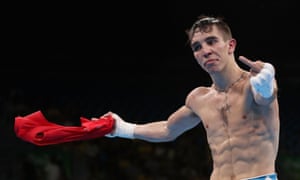The world governing body for amateur boxing has sidelined all 36 of the referees and judges who officiated at the Rio Olympics and dismantled its controversial “five star” officiating system that was implicated in corruption allegations.
Two months after the Guardian exclusively revealed concerns among senior officials over corrupt judging at the Rio Olympics and a string of high-profile incidents followed at the Games, the Amateur International Boxing Association (Aiba) said it had made the unprecedented decision while it carried out an investigation.
When the Guardian first revealed the concerns, Aiba said it would “continue to use any means, including legal action, to protect our sport and its community” and insisted that its certification process “ensures all our R&Js [referees and judges] have the highest levels of officiating and are in optimal situation to perform accordingly”.
But following meetings of its referee and judges and technical and rules commissions in Lausanne, the governing body said it had sidelined all 36 officials pending an investigation and proposed a series of changes to its judging system.
In the wake of the Guardian’s warning, the boxing competition erupted into controversy when the Irish boxer Michael Conlan publicly railed against corruption after losing in the bantamweight quarter-finals to the Russian Vladimir Nikitin. Conlan shouted into a ringside microphone: “They’re known for being cheats. Amateur boxing stinks from the core right to the top … I think boxing is dead. It’s about whoever pays the most money.”
There was widespread outrage after another Russian, the heavyweight Evgeny Tishchenko, beat Kazakhstan’s Vassiliy Levit to claim gold. Tishchenko was booed by the crowd after the decision.
And the American camp was furious after Gary Antuanne Russell lost to Uzbekistan’s Fazliddin Gaibnazarov. His father, Garry Russell Sr, said: “He got robbed, this is fucked up.” Floyd Mayweather Jr, who watched the bout, also said that Russell was “robbed – clearly, clearly”.
The governing body said in a statement: “While the majority of the boxing competition in Rio 2016 was received very positively … a small number of decisions under debate indicated that further reforms in the Aiba R&J procedures were necessary.
“Initial decisions were made on-site during Rio 2016 to ensure the smooth running of the rest of the competition. The results of a specific R&J investigation, currently underway, will allow Aiba to fully assess what action needs to be taken.”
During the Games, an unspecified number of judges were removed from the action. The Guardian understands that all seven so-called “five star” judges were among them.
Aiba has now dismantled the system, which it stoutly defended before the Games. The statement continued: “The current five-star R&J programme will be disbanded and there will be greater empowerment and efficiency brought to the role of the R&J evaluators during competitions.”
A spokesman would not elaborate on whether the individuals concerned would officiate again but did say that the enhanced terms that the five-star judges, who typically oversaw the biggest bouts, enjoyed would expire. The spokesman said: “The five-star R&Js are part of the ongoing global investigation concerning all of the 36 R&Js who officiated in Rio, there will be no comment made around their future assignments until the conclusion of our investigation. Following the disbanding of the five-star programme, all contracts will naturally expire.”

Karim Bouzidi, the Aiba executive director who had operational control for the Rio competition, had his duties “reassigned” during the Olympics at the same time as the judges were stood down.
Asked whether the Algerian, who took over from his South Korean predecessor, Kim Ho, in controversial circumstances two years earlier, still worked for Aiba the spokesman said: “Both parties are currently in ongoing discussions and no further comment will be made at this stage.”
Dr CK Wu, the Aiba president who is also a member of the International Olympic Committee executive board, refused to address the crisis in Rio beyond a limited statement.
Under pressure over the corruption allegations and the financial status of the governing body after a period of bold expansion, with the World Series of Boxing and other initiatives, Wu on Thursday said that the Rio Olympics were a “watershed moment” for Aiba. He continued: “Boxing was in the spotlight for positive reasons but occasionally also for the wrong ones. As an organisation, we have pulled together and I am extremely happy with the work that has been done this week by highly experienced members of our commissions, whose expertise and counsel will allow Aiba and its community to develop further throughout this next Olympic cycle.”
Amid a number of recommended changes, Aiba said it would continue with the “10 point must” scoring system introduced before Rio but in future would take all five judges’ cards into account rather than discounting two.
“It was also recommended that the draw of the R&Js for each bout will now be automated via our supplier Swiss Timing, and no longer conducted by a three-person draw commission to instil greater transparency,” said the statement.
The IOC told the Guardian after the Games that it would review Aiba just as it would every other sport. At the end of August, Aiba published a letter from the IOC president, Thomas Bach, in which he praised the “contribution and dedication” of Dr Wu. However, the same letter was sent to every sport after the Games.



